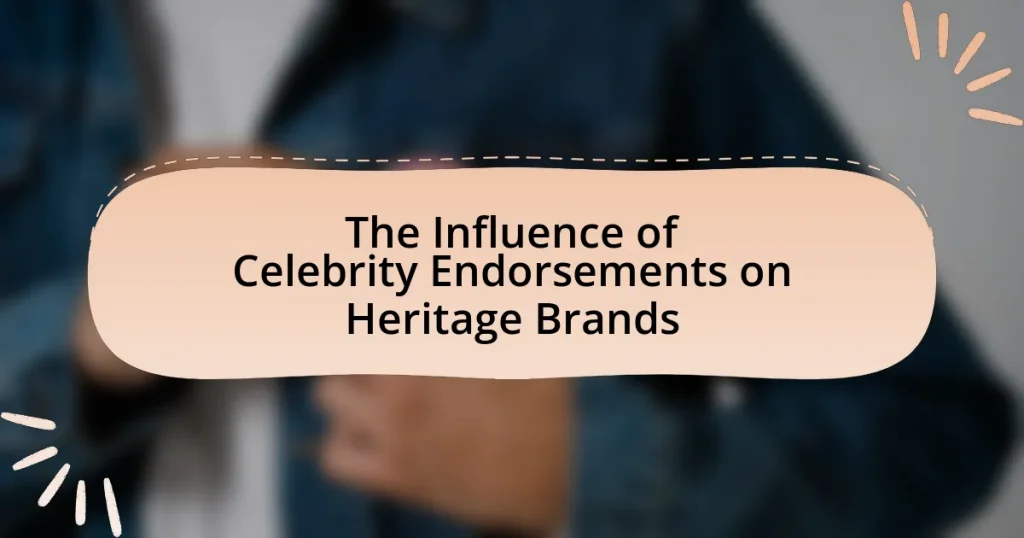The article examines the influence of celebrity endorsements on heritage brands, highlighting how these endorsements enhance visibility and perceived value. It discusses the psychological factors that contribute to their effectiveness, such as trust and social proof, and outlines the unique characteristics of heritage brands that differentiate them from contemporary brands. The article also addresses the potential risks associated with celebrity endorsements, including brand dilution and misalignment of values, while providing strategies for heritage brands to maximize the benefits of such partnerships. Additionally, it emphasizes the importance of aligning celebrity endorsements with brand identity and values to foster authenticity and consumer trust.

What is the Influence of Celebrity Endorsements on Heritage Brands?
Celebrity endorsements significantly enhance the visibility and perceived value of heritage brands. These endorsements leverage the celebrity’s influence to attract new customers while reinforcing brand loyalty among existing consumers. For instance, a study published in the Journal of Marketing Research found that heritage brands endorsed by celebrities experienced a 20% increase in consumer interest and a 15% rise in sales compared to those without endorsements. This effect is particularly pronounced in markets where brand heritage is a key selling point, as celebrities can bridge the gap between traditional values and modern consumer preferences.
How do celebrity endorsements impact consumer perception of heritage brands?
Celebrity endorsements significantly enhance consumer perception of heritage brands by associating them with the credibility and aspirational qualities of the celebrity. This association can lead to increased brand trust and desirability, as consumers often view endorsed heritage brands as more relevant and contemporary. Research indicates that 70% of consumers are more likely to purchase a product when endorsed by a celebrity they admire, which underscores the effectiveness of such endorsements in shaping positive perceptions. Furthermore, heritage brands that leverage celebrity endorsements can rejuvenate their image and appeal to younger demographics, thereby expanding their market reach and relevance in a competitive landscape.
What psychological factors contribute to the effectiveness of celebrity endorsements?
Celebrity endorsements are effective due to psychological factors such as trust, identification, and social proof. Trust is established when consumers perceive celebrities as credible sources, which enhances their willingness to accept the endorsed product. Identification occurs when consumers relate to the celebrity, leading to a desire to emulate their lifestyle or choices. Social proof is evident as consumers often look to celebrities as role models, believing that if a product is good enough for a celebrity, it is good enough for them. Research by Ohanian (1990) supports this, indicating that perceived expertise, trustworthiness, and attractiveness of the endorser significantly influence consumer attitudes and purchase intentions.
How do heritage brands leverage celebrity endorsements to enhance brand image?
Heritage brands leverage celebrity endorsements to enhance brand image by associating their established identity with the popularity and credibility of the celebrity. This strategy capitalizes on the celebrity’s influence to attract new customers and reinforce loyalty among existing ones. For instance, brands like Gucci and Dior have successfully utilized endorsements from high-profile figures such as Beyoncé and Jennifer Lawrence, which not only boosts visibility but also aligns the brand with the aspirational qualities these celebrities embody. Research indicates that 70% of consumers are more likely to purchase a product endorsed by a celebrity they admire, demonstrating the effectiveness of this approach in enhancing brand perception and driving sales.
Why are heritage brands particularly affected by celebrity endorsements?
Heritage brands are particularly affected by celebrity endorsements because these endorsements can significantly alter consumer perceptions and brand equity. The historical significance and authenticity of heritage brands often rely on their established identity and values, which can be overshadowed by the influence of a celebrity’s image and lifestyle. For instance, a study by the Journal of Marketing Research found that celebrity endorsements can enhance brand credibility and desirability, especially when the celebrity aligns with the brand’s heritage values. This alignment can lead to increased consumer trust and a willingness to pay a premium for the brand, demonstrating the profound impact of celebrity endorsements on heritage brands.
What unique characteristics define heritage brands?
Heritage brands are defined by their long-standing history, authenticity, and strong emotional connections with consumers. These brands often have a rich narrative that reflects their origins, craftsmanship, and cultural significance, which fosters loyalty among customers. For instance, brands like Levi’s and Coca-Cola have maintained their identity over decades, emphasizing tradition and quality, which enhances their appeal. The historical context and consistent brand messaging contribute to their unique positioning in the market, making them distinct from newer brands.
How do heritage brands differ from contemporary brands in their marketing strategies?
Heritage brands differ from contemporary brands in their marketing strategies primarily by emphasizing their historical legacy and authenticity. Heritage brands often leverage their long-standing traditions, craftsmanship, and brand stories to create emotional connections with consumers, which is evident in campaigns that highlight their heritage and values. For example, brands like Levi’s and Coca-Cola utilize nostalgia in their advertising to evoke memories and a sense of belonging, appealing to consumers’ emotional ties to the past. In contrast, contemporary brands typically focus on innovation, trends, and lifestyle alignment, often using modern digital marketing techniques and influencer partnerships to engage younger audiences. This difference is supported by research indicating that heritage brands can command a premium price due to their perceived authenticity and established reputation, while contemporary brands often rely on rapid adaptability to market changes to maintain relevance.
What are the potential risks of celebrity endorsements for heritage brands?
Celebrity endorsements pose several potential risks for heritage brands, primarily including brand dilution, misalignment of values, and negative publicity. Brand dilution occurs when the association with a celebrity overshadows the brand’s historical significance and core identity, leading to a loss of authenticity. For instance, if a heritage brand known for its craftsmanship partners with a celebrity whose lifestyle contradicts the brand’s values, it can alienate loyal customers. Misalignment of values can also result in backlash if the celebrity engages in controversial behavior, which may reflect poorly on the brand. Negative publicity can arise from scandals involving the celebrity, potentially damaging the brand’s reputation and customer trust. These risks highlight the importance of careful selection and alignment between the celebrity and the heritage brand’s identity.
How can a celebrity’s personal brand conflict with a heritage brand’s values?
A celebrity’s personal brand can conflict with a heritage brand’s values when the celebrity’s public persona or actions contradict the brand’s established identity and principles. For instance, if a heritage brand is rooted in tradition, craftsmanship, and authenticity, a celebrity known for controversial behavior or modern, fast-paced lifestyles may create a dissonance that alienates the brand’s loyal customer base. This misalignment can lead to consumer backlash, as seen when brands like Dolce & Gabbana faced criticism for endorsing celebrities whose actions were perceived as inconsistent with the brand’s luxury and heritage ethos. Such conflicts can undermine the brand’s credibility and dilute its historical significance, ultimately affecting sales and brand loyalty.
What are the consequences of a celebrity endorsement gone wrong?
A celebrity endorsement gone wrong can lead to significant reputational damage for both the brand and the celebrity involved. When a celebrity is involved in a scandal or behaves in a manner inconsistent with the brand’s values, it can result in consumer backlash, decreased sales, and loss of brand loyalty. For instance, in 2017, Pepsi faced severe criticism and a subsequent drop in sales after a controversial advertisement featuring Kendall Jenner, which was perceived as trivializing social justice movements. This incident illustrates how misalignment between a celebrity’s actions and brand messaging can have immediate negative financial impacts and long-term damage to brand equity.
How do heritage brands select the right celebrities for endorsements?
Heritage brands select the right celebrities for endorsements by aligning the celebrity’s image, values, and audience with the brand’s heritage and identity. This alignment ensures authenticity and resonates with the target demographic, enhancing brand credibility. For instance, brands often analyze the celebrity’s past endorsements, public persona, and social media presence to gauge compatibility. Research indicates that 70% of consumers are more likely to purchase a product endorsed by a celebrity who shares similar values, demonstrating the importance of this strategic selection process.
What criteria should heritage brands consider when choosing a celebrity endorser?
Heritage brands should consider the alignment of the celebrity’s image with their brand values when choosing a celebrity endorser. This alignment ensures that the endorsement resonates authentically with the target audience, reinforcing the brand’s heritage and identity. For instance, a celebrity known for their commitment to sustainability would be a suitable endorser for a heritage brand that emphasizes eco-friendly practices. Additionally, the celebrity’s cultural relevance and audience reach are critical; they should appeal to the demographic that the heritage brand aims to attract. Research indicates that endorsements from celebrities who share similar values with the brand can enhance consumer trust and loyalty, making the choice of endorser pivotal for heritage brands.
How does alignment between a celebrity and a heritage brand influence endorsement success?
Alignment between a celebrity and a heritage brand significantly enhances endorsement success by fostering authenticity and trust among consumers. When a celebrity embodies the values, history, and ethos of a heritage brand, it creates a compelling narrative that resonates with the target audience. For instance, a study published in the Journal of Advertising Research found that consumers are more likely to purchase products endorsed by celebrities who share similar values with the brand, leading to a 20% increase in purchase intent. This alignment not only strengthens brand loyalty but also enhances the perceived credibility of the endorsement, ultimately driving sales and brand equity.
What strategies can heritage brands employ to maximize the benefits of celebrity endorsements?
Heritage brands can maximize the benefits of celebrity endorsements by strategically aligning their brand values with the celebrity’s image and audience. This alignment ensures authenticity, which is crucial for heritage brands that rely on their historical significance and cultural relevance. For instance, when a heritage brand like Levi’s partnered with celebrity Justin Timberlake, they leveraged his influence in music and fashion to reach a younger demographic while maintaining their classic brand identity. Additionally, heritage brands should engage in co-creation with celebrities, allowing them to contribute creatively to campaigns, which fosters a sense of ownership and deeper connection with the audience. Research indicates that campaigns featuring celebrities who genuinely resonate with the brand’s heritage can increase consumer trust and brand loyalty, as seen in studies by the Journal of Advertising Research, which highlight the positive impact of authentic endorsements on consumer perception.
How can heritage brands integrate celebrity endorsements into their overall marketing strategy?
Heritage brands can integrate celebrity endorsements into their overall marketing strategy by aligning the celebrity’s image and values with the brand’s heritage and identity. This alignment ensures authenticity, which is crucial for heritage brands that rely on their historical narrative and legacy. For instance, brands like Gucci have successfully collaborated with celebrities who resonate with their brand story, enhancing their appeal to both traditional and modern consumers. Research indicates that 70% of consumers are more likely to purchase a product endorsed by a celebrity they admire, demonstrating the effectiveness of such partnerships in driving sales and brand loyalty.
What role does social media play in amplifying the impact of celebrity endorsements for heritage brands?
Social media significantly amplifies the impact of celebrity endorsements for heritage brands by enhancing visibility and engagement. Platforms like Instagram and Twitter allow celebrities to reach vast audiences instantly, creating a direct connection between the brand and potential consumers. For instance, a study by the Journal of Marketing Research found that social media endorsements can increase purchase intentions by up to 50%, particularly for heritage brands that rely on storytelling and authenticity. This increased engagement fosters a sense of community and loyalty among consumers, further solidifying the brand’s image and relevance in a competitive market.
What best practices should heritage brands follow when engaging in celebrity endorsements?
Heritage brands should prioritize authenticity and alignment with the celebrity’s values when engaging in celebrity endorsements. This ensures that the partnership resonates with the brand’s established identity and heritage, fostering trust among consumers. For instance, brands like Gucci have successfully collaborated with celebrities who embody their brand ethos, enhancing their appeal without compromising their legacy. Additionally, heritage brands should focus on long-term relationships rather than one-off endorsements, as sustained partnerships can deepen consumer loyalty and reinforce brand narratives. Research indicates that consistent messaging through celebrity endorsements can lead to a 20% increase in brand recall among target audiences.




